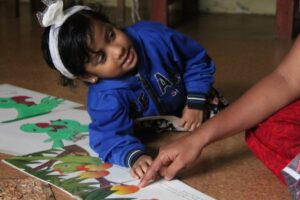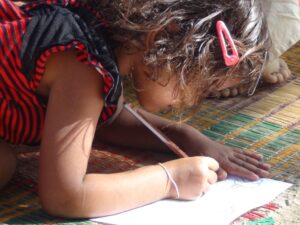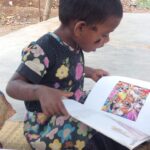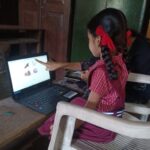
EMERGENT LITERACY
Children demonstrate awareness about printed materials well before they can be formally described as ‘readers’ and ‘writers’. In these early years, with exposure to books and by watching family members reading and writing, children develop a first-hand understanding of how written language connects with spoken language and represents meaning. They also learn how to handle literacy artefacts such as books, calendars and newspapers. When ‘writing’, they demonstrate their emergent understanding of the outward form of print and how strings of symbols represent words and meaning.
 Emergent literacy draws upon the child’s fluency with the spoken form of the language. As children become more proficient with recognizing aspects of the printed word, they are able to tell apart a target from pseudo-symbols and pseudo-words. They also become deft at turning pages, finding the start page of the story and guessing at words. They now understand that the printed unit must represent a word from their mental lexicon. They also have a growing basket of sight words – words they have become familiar with and can quickly recognise.
Emergent literacy draws upon the child’s fluency with the spoken form of the language. As children become more proficient with recognizing aspects of the printed word, they are able to tell apart a target from pseudo-symbols and pseudo-words. They also become deft at turning pages, finding the start page of the story and guessing at words. They now understand that the printed unit must represent a word from their mental lexicon. They also have a growing basket of sight words – words they have become familiar with and can quickly recognise.
Emergent Literacy and Early Childhood Education
Programmes to support and promote emergent literacy typically come bundled within an early childhood programme. These programmes are typically offered to children between the ages of three and six. We see our early childhood programmes as Stimulation Intervention Programmes (SIP).
A poorly thought through curriculum for Early Childhood Education (ECE) may leave a child in a resource poor setting doubly disadvantaged.
- Firstly , the ECE programme may not sympathetically bring the home culture and the social realities of participating children into the ECE setting. Ignoring of the child’s home and community experiences makes the school distant from the child’s lived reality.
- Secondly, the programme may not include enough general information from the larger world. When the curriculum is narrow and simplistic, then information that may be common knowledge for similar-age children in resource-rich settings may not be available to other children because these topics are also not part of their routine discourse in the home and community.
Our programmes attempt to create a balance between local experiences and information from a wider world.
Deepening and Widening Children’s Skills
Skills and knowledge around spoken language gained during early childhood go a long way in supporting later literacy development. These links between early spoken language and later written language skill attainments is true for all children, but particularly important for children in resource-poor settings. We have repeatedly found that reading comprehension attainments of primary and middle school children in resource-poor settings are low. There are several reasons for these attainment gaps. We highlight two.
- Authors often assume the child has prior knowledge about some elements in their story or essay. However, children from resource poor homes such prior knowledge may not be easily available to them. They may not have encountered these types of information in school, at home, or in their neighborhood.
- Children may have fallen behind in different domains of linguistic knowledge. Children from resource poor homes are often disadvantaged in their knowledge of the ‘formal’ sentence structures and the type of vocabulary found in written language. This is often because they have very few books to read and little or no discussion around books.
Our approach to developing an emergent literacy curriculum as part of ECE attempts to deepen and widen the roots for later linguistic fluency.
















